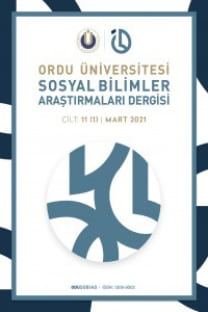Ölümsüzlük Düşüncesi Üzerine Dini ve Felsefi Bir Değerlendirme
Araştırmanın amacı, ölümsüzlük düşüncesi hakkında bir değerlendirme yapmaktır. Bilindiği gibi, ölüm ve ölüm ötesi, hem dini hem de felsefi tartışmaların odak noktalarından biridir. Zira, ölümden sonra bir hayatın olup olmadığı sorusu, din felsefesinin en önemli sorularından biridir. Doğal olarak bu sorunun iki olası cevabı vardır. Bunlardan biri ölümden sonra bir hayat vardır, diğeri ise yoktur.
Çalışmada, ilk olarak ölümden sonra bir hayatın olmayacağına dair görüşler hakkında değerlendirmeler yapacağız ve “ölümün her şeyin sonu olacağı” şeklindeki teorilerin hem psikolojik açıdan hem de felsefi açıdan problemlerini ortaya koyacağız. Ikinci olarak ise, “ölümün yeni bir başlangıç olacağı” şeklindeki görüşleri değerlendirip, hangisinin daha tatmin edici olduğunu ortaya koymaya çalışacağız.
Anahtar Kelimeler:
Din Felsefesi, Ölüm, Ölümsüzlük, Ölümden Sonra Hayat
A Religious and Philosophical Evaluation of the Concept of Immortality
The purpose of this study is to assess the idea of immortality. As it is known, death and post-death are one of the focal points of both religious and philosophical discussions. The question of whether there is a life after death is surely one of the most important questions that are asked in the philosophy of religion. Naturally, there are two possible answers to this question. One of them there will be a life after death, and the other will not.
Firstly, in this study, we will evaluate the views that there will be no life after death, and we will present both psychological and philosophical problems of that "death ends all" theories. Secondly, we will evaluate that “death will new beginning” theories and try to reveal which one is more satisfying.
Keywords:
Philosophy of Religion Death, İmmortality, Afterlife, Reincarnation,
___
- Andrade, G. (n.d.). Immortality | Internet Encyclopedia of Philosophy. Retrieved April 9, 2020, from https://www.iep.utm.edu/immortal/
- Blackburn, S. (1994). The Oxford Dictionary of Philosophy. Oxford University Press.
- Davis, S. T. (2000). Philosophy and Life After Death: The Questions and The Options. In B. Davies (Ed.), Philosophy of Religion: A Guide and Anthology. Oxford University Press.
- Descartes, R. (1960). Meditations on First Philosophy (L. J. Lafleur, Trans.; Second Edition). The Bobbs-Merrill Company.
- Epicurus. (1964). Letter to Menoecius. In R. M. Geer (Ed.), Epicurus: Letters, Principal Doctrines, and Vatican Sayings. Bobbs-Merrill.
- Feldman, F. (1991). Some Puzzles About the Evil of Death. The Philosophical Review, 100(2), 205–227. JSTOR.
- Flew, A. (1955). Can a Man Witness His Own Funeral? Hibbert Journal, 54, 242–250.
- Hewett, J. S. (Ed.). (1988). Illustrations Unlimited. Tyndale House Publishers.
- Hökelekli̇, H. (1991). Ölüm ve Ölüm Ötesi Psikolojisi. Uludağ Üniversitesi İlahiyat Fakültesi Dergisi, 3(3), 151–165.
- Kant, I. (2002). Critique of Pratical Reason (S. Engstrom & W. S. Pluhar, Trans.). Hackett Publishing Company.
- Lamont, C. (1936). The Illusion of Immortality. Watts & Co.
- Locke, J. (1894). An Essay Concerning Human Understanding.: Vol. II (A. C. Fraser, Ed.). Clarendon Press; Oxford University Press.
- Moore, C. H. (1931). Ancient Beliefs in the Immortality of the Soul: With Some Account of Their Influence on Later Views. Geroge G. Harrap & Co. Ltd.
- Peterson, M. L., Hasker, W., Reinhenbach, B., & Basinger, D. (2003). Reason & Religious Belief: An Introduction to The Philosophy of Religion (3th ed). Oxford University Press.
- Plato. (1875). Phaedo (E. M. Cope, Trans.). Cambridge University Press.
- Rhodes, R. (1996). Heaven: The Undiscovered Country. Resource Publications.
- Rosenbaum, S. E. (1986). How to Be Dead and Not Care: A Defense of Epicurus. American Philosophical Quarterly, 23(2), 217–225. JSTOR.
- Unamuno, M. de. (1921). The Tragic Sense of Life: In Men and In Peoples (J. E. C. Flitch, Trans.). Macmillan and Co. Limited.
- ISSN: 1309-9302
- Yayın Aralığı: Yılda 3 Sayı
- Başlangıç: 2010
- Yayıncı: -
Sayıdaki Diğer Makaleler
Toplumun Direnen Kaleleri ve Değişim Rüzgârları: Çikolata Filmi Örneğiyle
Halil İbrahim TURHAN, İsmail KURT
Türkiye'de Sürdürülebilirlik Raporlaması ve Kurumsal İtibar
Seçil DEREN VAN HET HOF, Sibel HOŞTUT
Canlılar Dünyasına Yolculuk Konu Alanına Yönelik Başarı Testi Geliştirme Çalışması
Ayça CİRİT GÜL, Zeki APAYDIN, Elif Omca ÇOBANOĞLU
Sosyal Bilgiler Öğretim Programındaki Değerlerin Sosyal Bilgiler Ders Kitaplarına Yansımaları
Geri Kazanılmış Pamuklu Kumaş Özelinde Tekstil Heykele Güncel Yaklaşımlar
Pandemi Sonrası Yeni Turist Tercihi: Glamping Turizmi
Türkiye’de Devlet ve Vakıf Üniversitelerinde Sosyal Medya Kullanımı
Ordu Yerel Basınında Kıbrıs Barış Harekâtı
